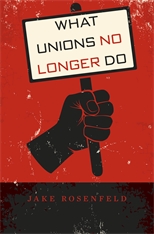Book Review: What Unions No Longer Do
What Unions No Longer Do. By Jake Rosenfeld . Cambridge, MA: Harvard University Press, 2014. 288 pp. ISBN 978-0-674725119, $39.95 (Cloth).
Barry Eidlin, currently an Assistant Professor of Sociology at McGill University, recently took the time to review the book in the October Issue of ILR Review.
From the review:
What Unions No Longer Do starts where many books about U.S. labor end, providing a summary of how dramatic union decline has been, how it compares to unions’ fate in other countries, and the various factors that have contributed to union decline. While this is well-worn territory, it provides a useful refresher
for those familiar with U.S. labor, while helping those less familiar with the scholarship about U.S. union decline get up to speed. The bottom line, as Rosenfeld concludes, is that “the private sector in this country is now nearly union-free, to a degree not seen in a century” (p. 30).
The qualifier about the private sector is important because of the large difference in union density between the private and public sectors. While the private sector is nearly union-free, roughly one-third of public-sector workers are union members. A majority of union members now work in the public sector. While some point to recent union growth in the public sector as a positive sign, Rosenfeld is more cautious. Although he recognizes the significance of these gains, he contends that public-sector growth cannot be the focus of union revitalization efforts. Just by sheer numbers, at barely one-tenth of overall employment, the public sector is too small to make a serious dent in aggregate union density. But more important, public-sector workers on average are better educated, better paid, and have better benefits than do private-sector workers. Union membership concentration in the public sector means that “[unions’] historical role representing those with comparatively low education and income levels [has been] reduced” (p. 66).
You can read the rest of the review from ILR Review for free for the next two weeks by clicking here. Like what you read? Click here to sign up for e-alerts and have all the latest research and reviews like this sent directly to your inbox!































































































